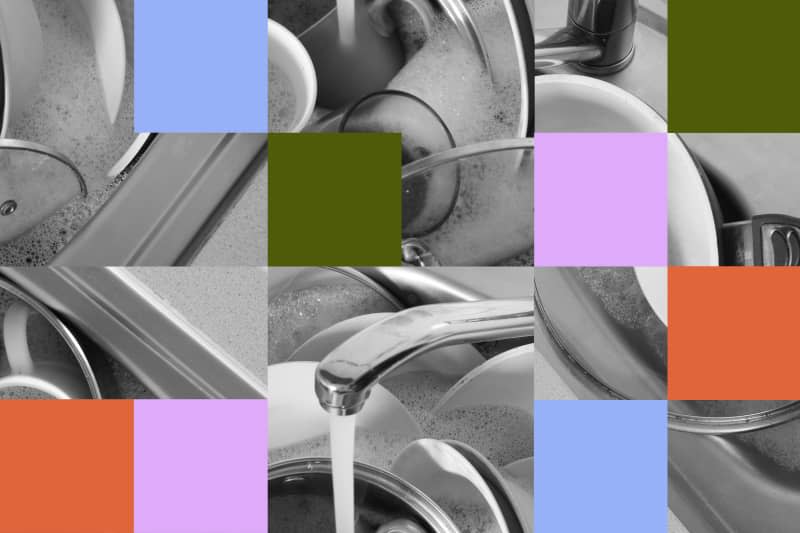I Have Contamination OCD — Here’s How I Manage

Every few days I’ll take a step back and look at the pile of dishes in my sink. Am I proud of it? No, of course not. Do I want to put them away? Yes, well, I guess as much as anyone wants to do the dishes, but I simply can’t because of my Obsessive Compulsive Disorder. I have a perceived fear of contamination that prohibits me from touching dirty dishes. Although a lot of people are familiar with OCD, it’s not often that people admit that it manifests in this manner.
Content warning: The content in this story discusses mental health disorder(s). If this content isn’t for you, we understand. But if you are struggling or experiencing any mental health concerns, please take a look at our resources section below and seek help from a professional healthcare provider.
“When someone with OCD struggles with touching dirty dishwasher due to contamination fears, this typically falls into the category of contamination OCD,” says Gabby Taubenfeld, a therapist at Empower Your Mind Therapy in New York City. “Contamination OCD generally involves distressing thoughts related to cleanliness and germs, which leads to compulsive behaviors aimed at preventing perceived contamination.”
As Taubenfeld explained, after having even a glimpse at the dirty dishwater and the jagged utensils, that’s when my thoughts start racing (what if I get sick? I don’t know whose germs are there. What if it gets in my mouth?) and they are so invasive that they physically prevent me from doing the dishes. As a result, the pile grows larger and the intensity of the thoughts gets stronger.
I understand this is a first-world problem, especially because I have a dishwasher, however, the process of getting the dishes from the sink into the appliance is a lot for me (and my OCD) to handle. I’ve been in therapy for years to try to get this under control, and I’ve had some success, but it’s still a challenge every time.
How Exposure Therapy Helps with Contamination OCD
“Exposure and response prevention (ERP), which is a type of Cognitive Behavioral Therapy, is the most common treatment for OCD,” says Taubenfeld. “The goal of ERP is to break this cycle by teaching those with OCD how to tolerate their distress through exposure.”
In the case of contamination OCD, this generally looks like touching a dirty dish and putting it down, then touching it again for a longer period. Finally, you’re able to pick it up long enough to put it in the dishwasher, and so on.
Although this may sound simple, for someone with OCD like myself, the act of touching the dish can be so distressing that it may take many months and lots of practice to be successful even at one time.
How I Manage My Contamination OCD
I’ve been in therapy for the past seven years and started doing exposure therapy within the last two or three; mainly once I moved out on my own and needed to try to get my life together. Because I see my therapist virtually, she’s had me practice by doing it with her in session so she can step in when needed. Aside from this, she’s worked with me to develop distress tolerance skills to help manage the uncomfortable feelings that arise when it’s time to do the dishes.
Right now, I can do plates and cups. Utensils are still my biggest issue, as those are what directly enter the mouth. In these instances, I’ll wear latex gloves, goggles, and a mask around my face. It’s not ideal by any means, but it’s progress, and I’m proud of myself for that.
For this type of treatment to be effective, it’s vital to see a mental health practitioner who can facilitate the process safely and healthfully. If it happens too quickly, it can be more triggering and less helpful. Trust me — I’ve learned the hard way. Trying to “suck it up” doesn’t provide long-term results.
Additionally, I’ve also found it helpful to have a support system. Sometimes my roommate or sister will load the dishwasher and it’ll save me a lot of distress. Other times, they’ll try to push me to see if I can do some of it on my own. They’ll stand by just in case it becomes too much, but having that positive reinforcement is helpful.
At the end of the day, my contamination OCD might get in the way of the “cleanliness” of my apartment — especially with the dishes — however, I’m actively working through it and that’s what matters most.
Mental Health Resources
If you (or someone you know) are struggling with mental health and need support, visit one of the following websites below or call any of their helplines:
For any life-threatening situations, call 911
National Alliance on Mental Illness: 800-950-6264
Hopeline: 800-442-4673
Depression and Bipolar Support Alliance: 800-826-3632
Disaster Distress Helpline: 1-800-985-5990

